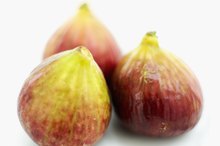What Fruits Are High in Carbohydrates?
When you're on an extremely low-carb diet that permits just 20 to 30 grams of carbs per day, all fruit is usually off the menu. It's still limited on a moderate low-carb diet because fruit contains natural sugars that boost its carbohydrate content. Modest servings of berries and melon are usually allowable on carb restrictions of 50 to 150 grams per day, but most low-carb dieters will avoid starchy fruits that are highest in carbohydrates, such as tropical fruits and dried fruits. When counting carbs in fruits, you'll use "net carbs," which are simply the total carbs minus the grams of fiber.
Carb-Heavy Lunchbox Fruit
The fruits you find in kids' lunchboxes are some of the highest-carb fruits available. A cup of orange sections or pear slices, for example, contain about 17 grams of net carbohydrates. One cup of apple slices comes in with a moderate carb count of 12 grams net carbs, but mash the fruit into 1 cup of applesauce and you'll get 25 grams of net carbs. If that applesauce is sweetened, you'll take in up to 40 grams. Pitted cherries are higher in carbs than grapes: Eat just 1 cup of grapes and get 15 grams of carbohydrates, but have a cup of sweet cherries and you'll consume 22 grams.
High Carbs in Tropical Fruit
Can You Eat Fruit on the Atkins Diet?
Learn More
Tropical fruits tend to be high in carbohydrates, too. One cup of banana slices, for example, contains 30 net grams of carbohydrates, and a cup of mango chunks contains 22 grams. Pineapple offers 19 grams of net carbs per cup, and the South Pacific breadfruit contains almost 60 grams of net carbs per cup. If you enjoy tropical fruit, papaya might be your lowest-carb option with 13 grams of net carbs per 1-cup serving.
Dried Fruit: Extremely High in Carbohydrates
The naturally occurring sugars in fruit concentrate when fruit is dried. One cup of unpacked raisins, for example, contains 110 grams of net carbs, and a cup of dried apricot halves contains 72 grams. By comparison, a cup of fresh apricots contains 15 grams of net carbs.
Some dried fruit also has sugar added, which further raises the carbohydrate count. Sweetened, dried cranberries, for example, contain 92 grams of net carbs per cup; sweetened, dried blueberries contain 116 grams of net carbs; while a cup of fresh blueberries contains 18 grams.
Best Fruits for Eating Low-Carb
Should I Juice if I Am on a Low-Carb Diet?
Learn More
Fruit offers valuable minerals, vitamins and antioxidants, so you shouldn't feel guilty about including moderate servings on occasion. Certain fruits may seem to have a fairly high number of carbs per serving but contain significant amounts of fiber, which passes through your system undigested and offers benefits to your digestive and heart health.
For example, 1/2 cup of raspberries contains 7 grams of carbohydrates but has 4 grams of fiber, so the net carb content is 3 grams per 1/2 cup.
Most berries are high in fiber, which is why they tend to be permissible on many low-carb plans. This fiber content lowers their net carb content. Some low-carb diets suggest you include a 1/4-cup serving of melon occasionally -- honeydew and cantaloupe have 3 to 4 grams of net carbs. Watermelon offers 11 grams of net carbs per cup and has very little fiber, so it's not usually recommended on low-carb plans.
Related Articles
References
- American Journal of Clinical Nutrition: Low-Carbohydrate Nutrition and Metabolism
- Atkins: Phase Two Allowable Foods
- Healthaliciousness: Applesauce, Papayas
- Healthaliciousness: Apples, Pears, Oranges
- Healthaliciousness: Grapes, Banana, Mango
- Healthaliciousness: Pineapple, Peaches, Breadfruit
- Healthaliciousness: Cherries, Raisins, Dried Apricots
- Healthaliciousness: Cranberries, Blueberries, Raspberries
- Healthaliciousness: Grapefruit, Apricots, Watermelon
Resources
Writer Bio
Andrea Cespedes is a professionally trained chef who has focused studies in nutrition. With more than 20 years of experience in the fitness industry, she coaches cycling and running and teaches Pilates and yoga. She is an American Council on Exercise-certified personal trainer, RYT-200 and has degrees from Princeton and Columbia University.









